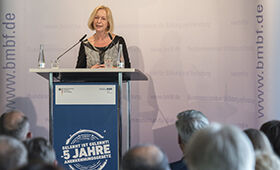Plenty of cause to celebrate
“5 years of the Recognition Act – once learned, never forgotten” – conference hosted in Berlin
A specialist conference entitled “5 years of the Recognition Act – once learned, never forgotten” was held at the Berlin Academy of Arts on 21 June 2017. The highlights of the event were the presentation of the results of an independent evaluation of the impact of the law and the awarding of the “Wir für Anerkennung” company prize.
Much praise for the Recognition Act
In her opening address, Federal Minister of Education and Research Professor Johanna Wanka underlined the societal significance of recognising professional and vocational qualifications. She pointed out that Germany’s prosperity depended on addressing the shortage of skilled workers the country faced. With regard to the demographic situation, Professor Wanka stated: “The developments which are occurring are not easy to compensate for. For this reason, the skilled worker issue is absolutely fundamental.” The minister was fulsome in her praise for the performance figures achieved in the recognition procedures. “The low rejection rate illustrates the quality of the guidance provided.” Professor Wanka said that further progress had come in the form of a possible grant of up to €600 for persons in employment who wished to gain recognition.
She admitted, however, that there was room for improvement in administrative practice within the federal states. This exhibited “considerable differences”, particularly in the field of the healthcare professions. “We need standard processes that apply nationwide,” she appealed. The establishment of a Central Assessment Agency for Healthcare Professions at the Central Office for Foreign Education (ZAB) represented a step in the right direction but was not yet sufficient in itself. “The authorities of the federal states must be given the resources they need. It is very important that the commitments made by the federal states in this regard are implemented,” said the Federal Minister of Education and Research. Professor Wanka saw further scope for improvement in the way in which the topic of “recognition” is marketed. It was now vital for companies to receive more comprehensive information on the opportunities afforded by recognition. Examples of how this could take place included the project “Anerkannt”, funded by the Federal Ministry of Education and Research (BMBF) and run by the Educational Institute of the German Confederation of Trade Unions, and the “Unternehmen Berufsanerkennung” scheme launched by the Association of German Chambers of Commerce and Industry (DIHK) and the German Confederation of Skilled Crafts (ZDH).
BA Chair Scheele calls for greater activity abroad
In his speech, Federal Employment Agency (BA) Chair Detlef Scheele emphasised the very good labour market situation in Germany. There were no indications that this would change in the near future. Indeed, the main question currently arising was how all the many existing vacancies could be filled. In order to facilitate more rapid integration into the German labour market for migrants, Mr. Scheele proposed that it should be made possible to complete parts of the recognition procedure directly from abroad. “Some aspects of the process of acquiring knowledge of the German language could, for example, take place in migrants’ home countries.” He felt that this might help prevent long waiting times for language courses for migrants already in Germany. During this period, they were unable to generate any income of their own whilst also having no right to state benefits.
Evaluation – recognition is working. Awareness still needs to be raised
At the conference, Dr. Stefan Ekert from the company InterVal GmbH and Dr. Christa Larsen from the Institute for Economics, Labour and Culture (IWAK) were also on hand to present the results of an independent evaluation on the impact of the Recognition Act. The evaluation was commissioned and supported within the scope of the BIBB Recognition Monitoring Project. The assessors found that the recognition procedures had been highly effective. It was difficult to think of any other administrative process in Germany that functioned better. “This is a procedure which has really made a mark,” said Mr. Ekert. The Recognition Act had delivered a particular benefit to nationals of so-called third countries, i.e. people from outside the European Union and European Economic Area, and to skilled workers in non-regulated occupations. The aim of providing employment appropriate to qualifications had also been achieved. This had led to very good integration into the labour market, better contracts of employment, and higher incomes. “The amount of people who are in employment that is in line with their qualifications has increased enormously,” stated Mr. Ekert. Christa Larsen highlighted the disproportionately high increase in the number of applications received from abroad. The evaluators recommended “further consolidation of measures aimed at increasing awareness of recognition”, particularly via social media. Companies operating in sectors where there was a shortage of skilled workers also needed to be provided with even better information.
Awarding of the “Wir für Anerkennung” company prize
The conference also saw the very first conferment of the “Wir für Anerkennung” company prize, organised as part of the BMBF-funded project “Unternehmen Berufsanerkennung”. Federal Minister of Education Johanna Wanka was joined by Dr. Eric Schweitzer, President of the Association of German Chambers of Commerce and Industry (DIHK), and Hans Peter Wollseifer, President of the German Confederation of Skilled Crafts (ZDH) as she presented the award to companies who had integrated professional and occupational recognition in an exemplary fashion. In the podium discussion that followed, there was universal agreement that awareness of recognition in companies needed to be raised still further. The DIHK President Eric Schweitzer welcomed the improvement in awareness levels, which had now reached 55 percent. “This is, however, still too low,” he commented. Hans Peter Wollseifer from the ZDH believes that recognition for interested parties already living in Germany is not the only important building block. “Recognition for skilled workers who are already resident here is just a small piece of the puzzle. Our aim is to attract the attention of more people from third countries.”

